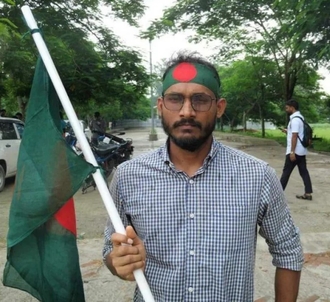One year has passed since Abu Sayeed, a bright young student and son of a poor farmer in Babanpur village, was shot dead during the Anti-Discrimination Student Movement. Yet for his family, the pain is as raw as it was on that fateful day, July 16, 2024.
Born the youngest of six brothers and three sisters, Sayeed had always been a source of pride and hope for his family. “My beloved son was a beacon of light in our lives,” said his father, Md Mokbul Hossain, standing by his son’s grave in the courtyard of their humble home. “His death shattered all our dreams.”
Sayeed, a student coordinator at Begum Rokeya University, Rangpur (BRUR), was killed by police firing near the university’s main gate. His death sent shockwaves through the student community and galvanized a peaceful movement into a national uprising. The protests that followed eventually led to the collapse of the then government. But for his family, political change means little without justice.
“My brother lies in eternal rest here, but every day I look at his grave and cry,” said Ramzan Ali, Sayeed’s elder brother. His younger sister, Sumi Khatun, added softly, “We had little, but we were happy. Now we have more, but no happiness. I want nothing but justice.”
Sayeed’s mother, Monwara Begum, clutched a photo of her son as she spoke, her voice breaking. “We will only find peace once those responsible for killing him are punished.”
Tomorrow marks the first anniversary of Sayeed’s martyrdom. It will be observed with solemn dignity at BRUR and in his home village. Family members, fellow students, and activists have all demanded that the trial of Sayeed’s murder and the broader July uprising cases be completed swiftly under the interim government.
There is, however, a shared sense of cautious hope.
“We trust the interim government and the International Crimes Tribunal,” said Abu Hossain, another brother. “We thank them for their promise to deliver justice before their term ends.”
Sayeed’s legacy lives on not just in his family’s hearts, but in the lives he touched and the movement he helped lead. Tawhidul Haque Siam, a fellow student who was critically injured while trying to save Sayeed, still carries 60 splinters in his body. “Sayeed always stood against injustice,” he said. “He died doing what he believed in.”
The Vice-Chancellor of BRUR, Prof. Dr. Md Showkat Ali, called Sayeed a symbol of courage. “His supreme sacrifice gave BRUR a place in the nation’s history. Justice in his name will bring healing not just to his family, but to all who lost someone in the July movement.”
Former student leaders echoed that sentiment. “We want the trial to end with a verdict that shows no one is above justice,” said Md Rahamat Ali, a CSE student and ex-coordinator. “Let Sayeed’s case be a milestone in our judicial history.”
As the sun sets over Babanpur, the call for justice grows louder. For Sayeed’s family, one thing is clear — though he is gone, his voice still echoes in the hearts of a nation not ready to forget.


